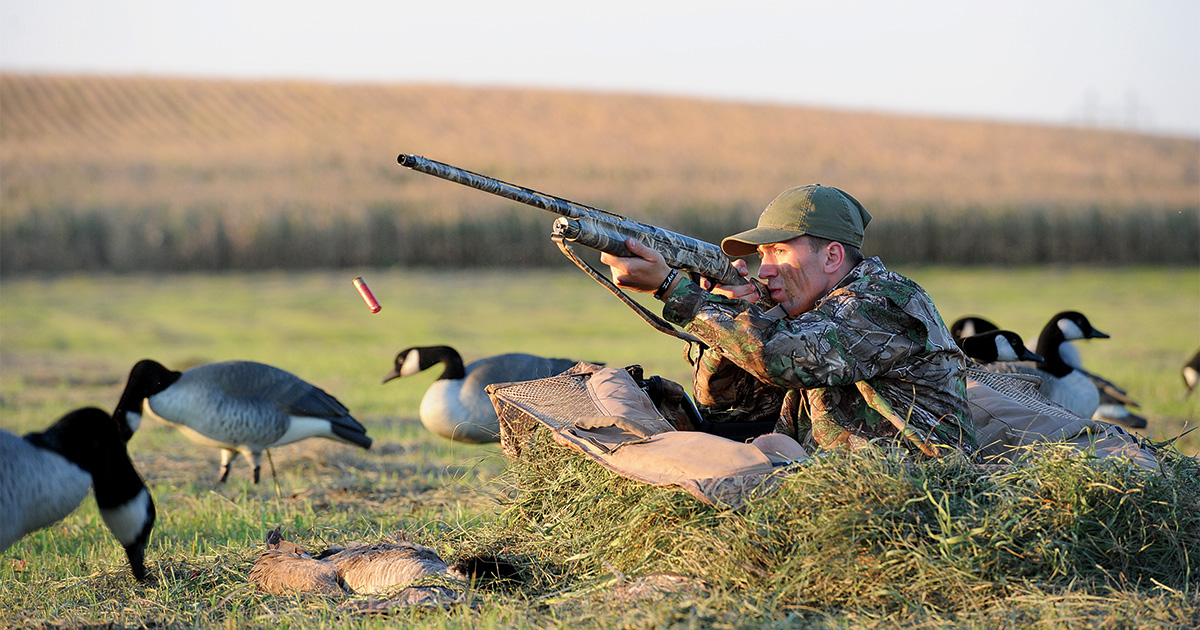Waterfowler's World: Early Goose Bonanza
In many states, resident Canada goose seasons provide hunters with high-limit, early-season action
In many states, resident Canada goose seasons provide hunters with high-limit, early-season action

By Bill Buckley

GOOSE GUIDANCE: Resident Canada geese behave differently from migrators. Scout thoroughly to find the X, keep your decoy spread relatively small, and call only when necessary.
Anywhere there's cut grass and water, there's bound to be a Canada goose these days. Canadas that nest and reside in one area most or all of the year are referred to as "resident" geese, and their populations have ballooned in recent years. Like white-tailed deer, they have flourished in suburban areas where they have few, if any, natural predators. To some folks, these geese are a blessing. To others they are a nuisance. Some burgeoning resident goose populations have created enough problems to warrant early-season hunts, which take place before migratory birds arrive.
Here's some advice on how to take full advantage of these unique hunting opportunities.
By early September, very few grain fields have been harvested up north. So Connecticut sportsman Matt Wettish targets small farms, where grazed-down pastures offer plenty of food. He also watches hay fields adjacent to cornfields. "Geese will use these short-grass fields as staging areas," Wettish says. "As it gets closer to the corn harvest, their numbers will continue to build. When harvesting occurs at the same time every year, it's amazing how geese cue in on it."
In Tennessee, where most fields are harvested by the time the early season begins, lifelong waterfowler Bill Cooksey has found that one of the most underutilized hunting spots is water. "Perhaps the best opportunities in my area are along the Tennessee River system," he says. "Geese will trade up and down the rivers, and due to boat traffic they're constantly being rousted. Decoy spreads on sandbars and other goose hangouts can be super effective."
Both experts recommend spending lots of time scouting. If you hunt food sources you need to set up right on the X, because resident geese know exactly where they're going. Wettish says it takes geese in his area a few days at most to find newly harvested fields. However, since there's no shortage of food at that time, geese won't fly far to feed, so look for fields close to roosts.
You will likely be hunting these birds in different habitats than you would migratory geese, and at a different time of year. So keep an open mind and adjust tactics based on the birds' behavior. For example, hunters in densely populated and wooded areas like New England will often find geese in narrow pastures surrounded by woods. One of Wettish's favorite spots is a small horse farm. "Here you can't count on resident geese adhering to the same rules as other geese," he says. "For instance, due to tree lines blocking wind, obstacles like trees and buildings will determine the birds' approach, not the wind. Every place is different, and only by watching geese work will you know how best to set up."
For the most part, you'll want to employ the same decoy and calling tactics you would use during the regular season. That means mimicking what the geese are doing and calling only as much as necessary. However, Cooksey advises against using large spreads. "One of the great things about this time of year is that you don't need more than two dozen to three dozen decoys, because you're not hunting migrators," he says. "In fact, setting a massive spread can actually spook birds."
Wettish likes to match decoy numbers to what he's seeing on the ground. "In cut corn and staging areas like hay fields, I'll increase my spread to match building goose numbers, from a few dozen initially up to about a hundred," he explains. "But when I'm hunting small pastures like that horse farm, I'll stick with a small spread of full-bodies."
Hunting resident honkers anywhere but grain fields renders standard waterfowl camouflage ineffective, since vegetation is still summertime green. "I tell people to dress like they're going turkey hunting," Wettish says. "In small pastures I'll frequently use shrubs and bushes as blinds, augmenting them with some cut brush from inside a woodlot. Fact is, in September you don't need to overthink it; hunting resident Canadas isn't as complicated or as difficult as most hunters believe."
Ducks Unlimited uses cookies to enhance your browsing experience, optimize site functionality, analyze traffic, and deliver personalized advertising through third parties. By continuing to use this site, you agree to our use of cookies. View Privacy Policy